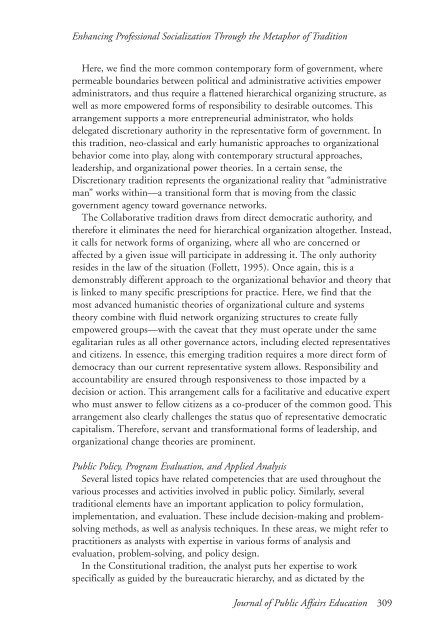JOURNAL OF PUBLIC AFFAIRS EDUCATION - naspaa
JOURNAL OF PUBLIC AFFAIRS EDUCATION - naspaa
JOURNAL OF PUBLIC AFFAIRS EDUCATION - naspaa
You also want an ePaper? Increase the reach of your titles
YUMPU automatically turns print PDFs into web optimized ePapers that Google loves.
Enhancing Professional Socialization Through the Metaphor of Tradition<br />
Here, we find the more common contemporary form of government, where<br />
permeable boundaries between political and administrative activities empower<br />
administrators, and thus require a flattened hierarchical organizing structure, as<br />
well as more empowered forms of responsibility to desirable outcomes. This<br />
arrangement supports a more entrepreneurial administrator, who holds<br />
delegated discretionary authority in the representative form of government. In<br />
this tradition, neo-classical and early humanistic approaches to organizational<br />
behavior come into play, along with contemporary structural approaches,<br />
leadership, and organizational power theories. In a certain sense, the<br />
Discretionary tradition represents the organizational reality that “administrative<br />
man” works within—a transitional form that is moving from the classic<br />
government agency toward governance networks.<br />
The Collaborative tradition draws from direct democratic authority, and<br />
therefore it eliminates the need for hierarchical organization altogether. Instead,<br />
it calls for network forms of organizing, where all who are concerned or<br />
affected by a given issue will participate in addressing it. The only authority<br />
resides in the law of the situation (Follett, 1995). Once again, this is a<br />
demonstrably different approach to the organizational behavior and theory that<br />
is linked to many specific prescriptions for practice. Here, we find that the<br />
most advanced humanistic theories of organizational culture and systems<br />
theory combine with fluid network organizing structures to create fully<br />
empowered groups—with the caveat that they must operate under the same<br />
egalitarian rules as all other governance actors, including elected representatives<br />
and citizens. In essence, this emerging tradition requires a more direct form of<br />
democracy than our current representative system allows. Responsibility and<br />
accountability are ensured through responsiveness to those impacted by a<br />
decision or action. This arrangement calls for a facilitative and educative expert<br />
who must answer to fellow citizens as a co-producer of the common good. This<br />
arrangement also clearly challenges the status quo of representative democratic<br />
capitalism. Therefore, servant and transformational forms of leadership, and<br />
organizational change theories are prominent.<br />
Public Policy, Program Evaluation, and Applied Analysis<br />
Several listed topics have related competencies that are used throughout the<br />
various processes and activities involved in public policy. Similarly, several<br />
traditional elements have an important application to policy formulation,<br />
implementation, and evaluation. These include decision-making and problemsolving<br />
methods, as well as analysis techniques. In these areas, we might refer to<br />
practitioners as analysts with expertise in various forms of analysis and<br />
evaluation, problem-solving, and policy design.<br />
In the Constitutional tradition, the analyst puts her expertise to work<br />
specifically as guided by the bureaucratic hierarchy, and as dictated by the<br />
Journal of Public Affairs Education 309
















